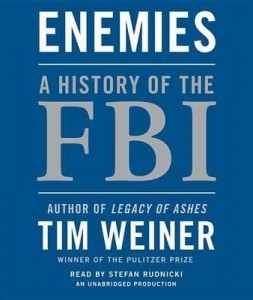We know, more or less, about J. Edgar Hoover and his excesses, but there’s a lot more appalling information in the history of the FBI. Paul O’Connor reviews a new book that lays out many of the excesses and shortcomings.
By Paul T. O’Connor
ENEMIES: A History of the FBI. By Tim Weiner. Read by Stefan Rudnicki. Random House Audio. 15 CDs. 18½ hours. $45. Also available in hardback.
 How the United States avoided the post-World War I march to fascism has long been a matter of discussion. Were our democratic institutions so strong that they resisted these forces? Or was democracy so deeply ingrained in our national psyche?
How the United States avoided the post-World War I march to fascism has long been a matter of discussion. Were our democratic institutions so strong that they resisted these forces? Or was democracy so deeply ingrained in our national psyche?
After reading Enemies: A History of the FBI by Tim Weiner, a Pulitzer Prize and National Book Award winner for his reporting on intelligence matters, I have my answer to that question: incompetence.
The FBI that Weiner describes employed many of the practices of a fascist secret police. Over its more than 100-year history, the FBI has regularly conducted illegal break-ins, warrantless searches, and illegal wiretaps and buggings. The bureau detained people and stashed them away outside of the courts system, and it disobeyed or ignored court orders and rulings. At times, its directors blatantly disobeyed orders from the U.S. attorney general and president.
At times armed by Congress with anti-sedition laws that would later be overturned by the courts, and at other times armed only by the disregard for law exhibited by its directors – mostly J. Edgar Hoover – the FBI still managed to botch thousands of cases. Our secret police of the 1920s and 1930s simply wasn’t good enough to lead us into fascism.
And, in later years, in cases of international terror or foreign spying and infiltration, the FBI expended as much of its efforts undermining the Central Intelligence Agency – which had a mutual distaste for the FBI – as it did on our enemies from abroad.
Over 18½ mesmerizing hours, Weiner paints a detailed and documented picture of a dysfunctional agency run first as a personal fiefdom by Hoover until his death in 1972 and in later years by other rogues and incompetents.
In Hoover’s case, as his power grew, the FBI became increasingly independent of U.S. law and its elected superiors. It’s a story well known by now, but it is also one that is stunning in its detail.
Hoover was obsessed with the so-called communist threat to the United States, and he chased communists wherever he imagined that they lurked. It is absolutely fascinating to hear of Hoover’s single-mindedness regarding the communists during World War II, a time when German provocateurs posed an imminent threat on our shores.
While the FBI certainly had its successes in crushing some enemy units within the country, the story of this book is that it failed in far too many cases, especially after the 1980s when Soviet (or Russian), Chinese and Cuban spies infiltrated the U.S. government and stole some of our most precious military secrets while also destroying our ability to penetrate their governments through our own espionage.
In some cases, the FBI’s failures stemmed from focusing on the wrong places – on Martin Luther King Jr., for example, as a suspected communist while real enemy operations went unnoticed. In other cases, such as the first bombing of the World Trade Center, the failures stemmed from simple negligence. In that case, the FBI held, unread for several years, a diary that contained information on plans to attack the towers.
In the FBI’s most famous failing, it missed key clues indicating that Islamic terrorists planned to attack the WTC a second time. That FBI failure was not alone, however, in costing American lives. It was simply the greatest example of the bureau’s incompetence as laid out by Weiner.
Although Stefan Rudnicki does an excellent job of narrating Enemies, I wish I had read the book rather than listened. There is so much detail that one wants to underline and dog-ear pages and to take notes. That’s so much easier to do with a book than a CD.
- Paul T. O’Connor, contributing editor, is a university lecturer who is available for freelance writing assignments. Contact him at ocolumn@gmail.com.